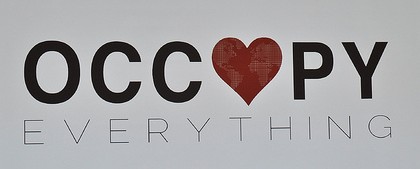by Simon Travis
When I showed up at the “Portland Candidate Forum” on January 19th, I wasn’t quite sure what to expect. It was held at St. Philip Neri Church on SE Division and 16th. The League of Women Voters of Portland, and the Southeast Uplift Neighborhood Coalition along with many other co-sponsors organized the event.
The hall reminded me of a VFW, minus the bar: functional, but not pretty–a good-sized space for a decent number of people. There were fifteen or so round white tables, squeezed into the room, with five to ten people per table. Each table was replete with stacks of handouts, blank index cards, pens, yellow sticky notes, and (tragically) name tags. I came to listen. Once you see name tags, you know they expect you to talk.
The forum’s stated goal was to provide input for a report describing the skills people desire in their local representatives. From what I saw, an additional, secret goal was to get neighborhood groups to build trust with each other before the election season kicks off. Among the many stated attributes of what people were seeking in good candidates, absolutely no one said: I want a progressive (or a conservative), I want them to support the Columbia River Crossing (or public transit), etc. The organizers managed to avoid people bickering over issues by not focusing on positions. Pretty neat!
In terms of active inclusion of diverse neighborhoods, there was an English-Spanish translator ($35 dollars an hour for non-profit events, in case you’re curious). All the Spanish speakers sat together, with headphones tuned to the translator’s mic. Not perfect, but better than I’ve seen at most events. There was also a table of folks that looked like they were staying at the church’s shelter for the night. They participated, and that was cool.
Interestingly, the first thing we were asked to do was to have one-on-one conversations with people at our table about frustrating experiences they’ve had at City Hall. Whether deliberate or not, this set up a bond of commiseration. One mentioned the concern that special interests have too much sway in decision making, and his example was the cycling community (how awesome that in Portland, bicyclists are organized enough to be considered a special interest – swarm it!), but since the conversation wasn’t about “more bike lanes or less”, the rest of the attendees were able to empathize based upon times when their own voices had been ignored or marginalized.
From that clever setup, a lot of good conversations were had. Each table had their own chats about desired qualities, and at the end, each table reported back to the room as a whole. At my table, we only had a few people, so the paid (dollar per hour unknown) facilitator, and the (volunteer?) note-taker, wound up getting into the conversation as well.
For a complete picture of the event, keep an eye on http://www.southeastuplift.org/ for the official report; here’s just a few of the things that stood out to me.
First, the City of Portland has one of the last remaining “commission” forms of government in the country. Those serving on the council, including the mayor, have both executive and legislative powers. They pass laws, and regulations, but they also administrate bureaus. This means they are tasked with implementing the regulations they pass.
Second, many people had issues with breakdown in continuity for long term neighborhood plans after elections. Each time, the new councilor, and arguably more importantly–their new staff, must be brought up to speed on previous decisions. New relationships must be built; and, at times, plans that neighborhoods have worked hard on are thrown out and completely redone. The neighbors haven’t changed, it’s only the person in office.
Additionally, people felt like City Hall should rely on existing neighborhood and community groups to a greater extent rather than take on so much themselves. People desire to be empowered. They also noted how frequently council members are pulled in different directions by the dual role they play.
Many different groups expressed a desire for mandatory training of elected officials. Among the suggestions were: cultural competency, facilitation, and conflict resolution classes. What a genius idea that would be! I wonder if required certified coursework at all levels of government would change who ran for office. I, for one, would like to see the Republican presidential candidates’ grades from a women’s studies class.
Here are a few attributes people mentioned which lodged in my ear: humility, creativity, neutrality, stewardship, accessibility, courtesy, an attitude of service, a champion of transparency, a good planner, a magnet to draw outside leaders to the city (That last one I find slightly questionable, but better than driving community leaders away, I guess), a person who has the ability to listen, a person who understands equity, someone who understands how community organizing works, Someone who strives, not just for openness but for active inclusion.
Immediately after report backs, the event was done. We were all thanked perfunctorily and that was that. I would have liked to have continued to have discussions about these things, perhaps separate into groups around categories that interested us most. Maybe, I’m just getting used to Occupy meetings.
It’d be interesting to infuse some of these community thoughts into the upcoming town hall Occupy is hosting on Saturday, Jan 28th. (Learn more at pdxvoices.org) It’s looking like all the candidates running for mayor and city council will be there. It will be a great opportunity not just to talk about the issues, but also the process by which issues are solved. Hope to see you there!







